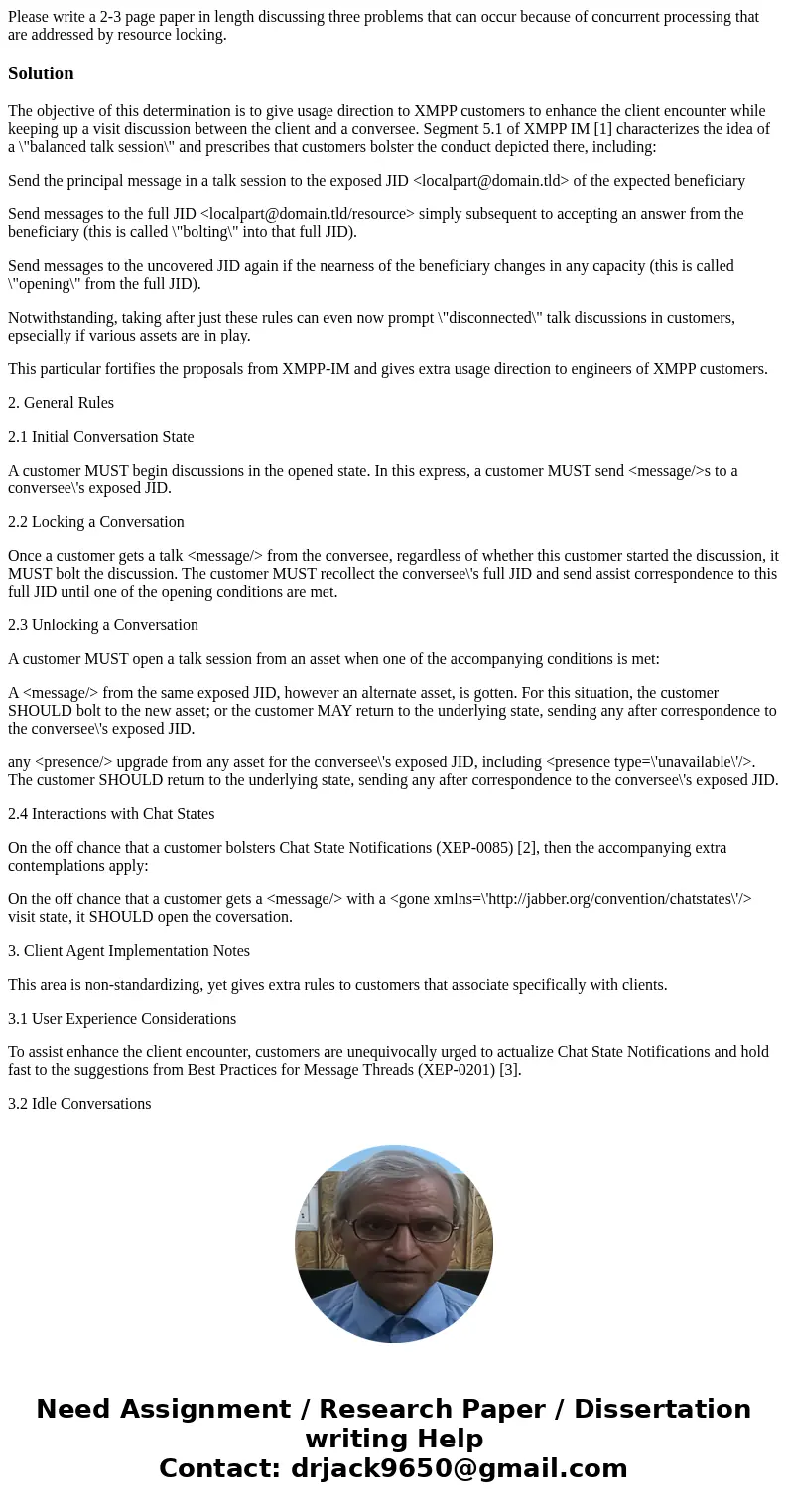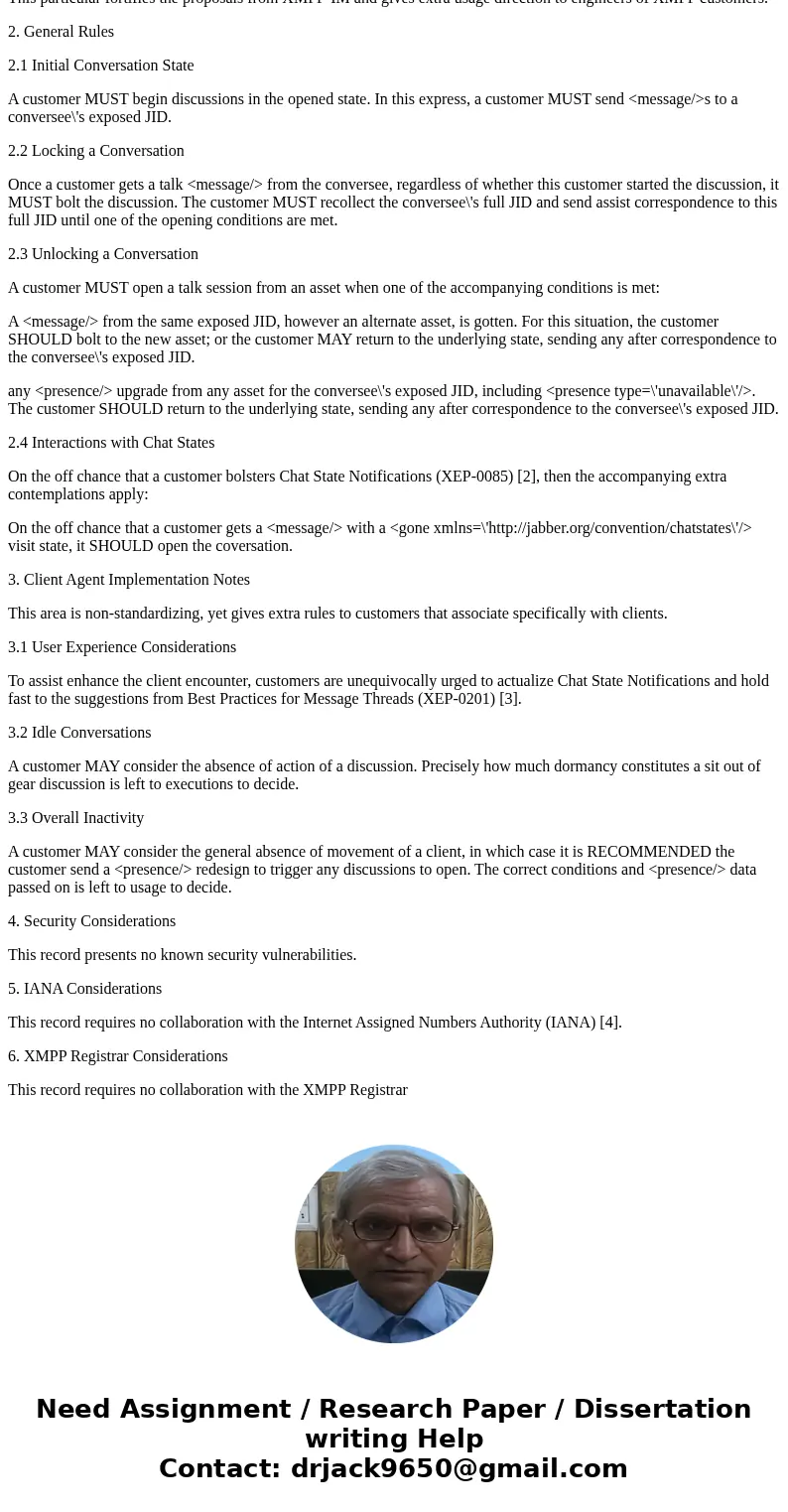Please write a 23 page paper in length discussing three prob
Please write a 2-3 page paper in length discussing three problems that can occur because of concurrent processing that are addressed by resource locking.
Solution
The objective of this determination is to give usage direction to XMPP customers to enhance the client encounter while keeping up a visit discussion between the client and a conversee. Segment 5.1 of XMPP IM [1] characterizes the idea of a \"balanced talk session\" and prescribes that customers bolster the conduct depicted there, including:
Send the principal message in a talk session to the exposed JID <localpart@domain.tld> of the expected beneficiary
Send messages to the full JID <localpart@domain.tld/resource> simply subsequent to accepting an answer from the beneficiary (this is called \"bolting\" into that full JID).
Send messages to the uncovered JID again if the nearness of the beneficiary changes in any capacity (this is called \"opening\" from the full JID).
Notwithstanding, taking after just these rules can even now prompt \"disconnected\" talk discussions in customers, epsecially if various assets are in play.
This particular fortifies the proposals from XMPP-IM and gives extra usage direction to engineers of XMPP customers.
2. General Rules
2.1 Initial Conversation State
A customer MUST begin discussions in the opened state. In this express, a customer MUST send <message/>s to a conversee\'s exposed JID.
2.2 Locking a Conversation
Once a customer gets a talk <message/> from the conversee, regardless of whether this customer started the discussion, it MUST bolt the discussion. The customer MUST recollect the conversee\'s full JID and send assist correspondence to this full JID until one of the opening conditions are met.
2.3 Unlocking a Conversation
A customer MUST open a talk session from an asset when one of the accompanying conditions is met:
A <message/> from the same exposed JID, however an alternate asset, is gotten. For this situation, the customer SHOULD bolt to the new asset; or the customer MAY return to the underlying state, sending any after correspondence to the conversee\'s exposed JID.
any <presence/> upgrade from any asset for the conversee\'s exposed JID, including <presence type=\'unavailable\'/>. The customer SHOULD return to the underlying state, sending any after correspondence to the conversee\'s exposed JID.
2.4 Interactions with Chat States
On the off chance that a customer bolsters Chat State Notifications (XEP-0085) [2], then the accompanying extra contemplations apply:
On the off chance that a customer gets a <message/> with a <gone xmlns=\'http://jabber.org/convention/chatstates\'/> visit state, it SHOULD open the coversation.
3. Client Agent Implementation Notes
This area is non-standardizing, yet gives extra rules to customers that associate specifically with clients.
3.1 User Experience Considerations
To assist enhance the client encounter, customers are unequivocally urged to actualize Chat State Notifications and hold fast to the suggestions from Best Practices for Message Threads (XEP-0201) [3].
3.2 Idle Conversations
A customer MAY consider the absence of action of a discussion. Precisely how much dormancy constitutes a sit out of gear discussion is left to executions to decide.
3.3 Overall Inactivity
A customer MAY consider the general absence of movement of a client, in which case it is RECOMMENDED the customer send a <presence/> redesign to trigger any discussions to open. The correct conditions and <presence/> data passed on is left to usage to decide.
4. Security Considerations
This record presents no known security vulnerabilities.
5. IANA Considerations
This record requires no collaboration with the Internet Assigned Numbers Authority (IANA) [4].
6. XMPP Registrar Considerations
This record requires no collaboration with the XMPP Registrar


 Homework Sourse
Homework Sourse